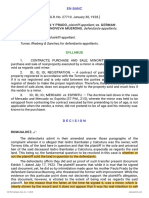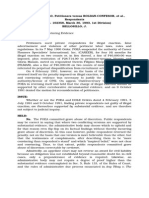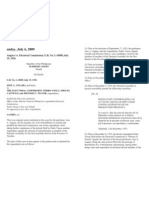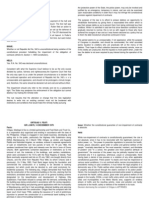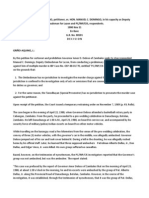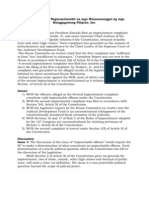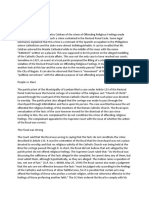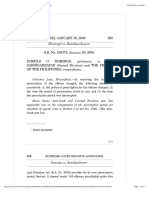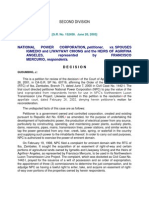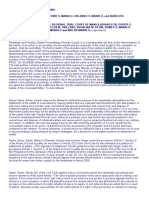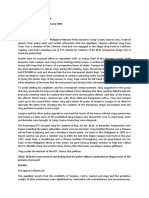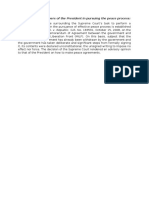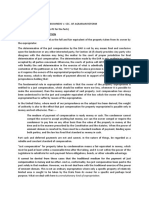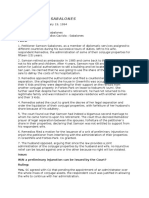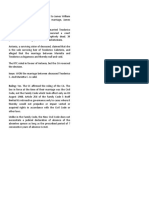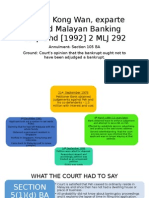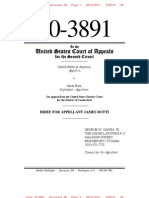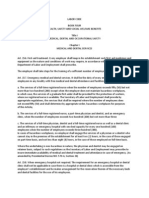Pilar Manalo Vs CA
Pilar Manalo Vs CA
Uploaded by
Trina RiveraCopyright:
Available Formats
Pilar Manalo Vs CA
Pilar Manalo Vs CA
Uploaded by
Trina RiveraOriginal Description:
Original Title
Copyright
Available Formats
Share this document
Did you find this document useful?
Is this content inappropriate?
Copyright:
Available Formats
Pilar Manalo Vs CA
Pilar Manalo Vs CA
Uploaded by
Trina RiveraCopyright:
Available Formats
PILAR S. VDA. DE MANALO, ANTONIO S. MANALO, ORLANDO S.
MANALO, and ISABELITA MANALO
(Oppositors) VS HON. COURT OF APPEALS, HON. REGIONAL TRIAL COURT OF MANILA (BRANCH 35),
PURITA S. JAYME, MILAGROS M. TERRE, BELEN M. ORILLANO, ROSALINA M. ACUIN, ROMEO S.
MANALO, ROBERTO S. MANALO, AMALIA MANALO and IMELDA MANALO G.R. No. 129242 (2001)
FACTS: The decedent Troadic Manaloa died intestate and was survived by his wife Pilar and eleven (11)
children. He left several heirs and several real properties in Manila and a business (Machine shop) in
Tarlac. After his death, eight (8) of his children (respondents) filed a petition for the judicial settlement
of his estate and for appointment of their brother Romeo Manalo as administrator
On the date set for hearing of the petition the trial court issued an order “declaring the whole world in
default, except the government”. However, the trial court set aside the order of general default of the
petitioners (the remaining children of Troadic who did not join the 8) and they were granted 10 days
within which to file their opposition to the position
The petitioners then filed an Omnibus Motion.
Some of the heirs including his surviving spouse moved to dismiss the petition contending that there was
failure to comply with a condition precedent due to the absence of an allegation of earnest efforts
toward a compromise among members of the same family.
The motion was denied, hence, they raised before the Supreme Court in a Petition for Certiorari the
denial of the said motion. They claimed that the petition for judicial settlement was actually an ordinary
civil action involving members of the same family, which requires an allegation of earnest efforts to
compromise.
ISSUE: WON the case at bar is covered under Article 151 where earnest efforts toward compromise
should first be made prior the filing of the petition.
RULING: No. Art 151 of FC which prohibits suit between members of the family absent a compromise, is
not applicable in the case at bar for such is only a special proceeding and not an ordinary civil action.
It is a fundamental rule that in the determination of the nature of an action or proceeding, the averments
and the character of the relief were sought in the complaint or petition, shall be controlling. The
careful scrutiny of the petition for the issuance of letters of administration, settlement and distribution
of the estate belies herein petitioners’ claim that the same is in the nature of an ordinary civil action. The
provision of Article 151 is applicable only to ordinary civil actions. It is clear from the term “suit” that it
refers to an action by one person or persons against another or other in a court of justice in which the
plaintiff pursues the remedy which the law affords him for the redress of an injury or enforcement of a
right. It is also the intention of the Code Commission as revealed in the Report of the Code Commission
to make the provision be applicable only to civil actions. The petition for issuance of letters of
administration, settlement, and distribution of estate is a special proceeding and as such a remedy
whereby the petitioners therein seek to establish a status, a right, or a particular fact. Hence, it must
be emphasized that herein petitioners are not being sued in such case for any cause of action as in fact
no defendant was pronounced therein. Private respondents herein merely seek to establish the fact of
death of their father and subsequently to be duly recognized as among the heirs of the said deceased
so that they can validly exercise their right to participate in the settlement and liquidation of the estate
of the decedent consistent with the limited and special jurisdiction of the probate court.
You might also like
- 1 - Air Law Questions - FinalDocument106 pages1 - Air Law Questions - FinalAnup Singh100% (4)
- Affidavit of Loss Lost Blue Book and Official Receipts Marifi TamayoDocument1 pageAffidavit of Loss Lost Blue Book and Official Receipts Marifi TamayoJaime Gonzales100% (1)
- 1106 - Imuan, Et Al Vs Juanito CerenoDocument6 pages1106 - Imuan, Et Al Vs Juanito CerenoDayle ManlodNo ratings yet
- Noncompete AgreementDocument2 pagesNoncompete AgreementRocketLawyer86% (138)
- Gammon Philippines, Inc. v. Metro Rail Transit Development Corporation, G.R. No. 144792, January 31, 2006Document3 pagesGammon Philippines, Inc. v. Metro Rail Transit Development Corporation, G.R. No. 144792, January 31, 2006Kris Razo100% (1)
- Salient Provisions of Republic Act No 7160Document26 pagesSalient Provisions of Republic Act No 7160May Joy Janapon Torquido-Kunso100% (1)
- Bambalan v. MarambaDocument2 pagesBambalan v. MarambaGabrielle Bea TardioNo ratings yet
- Waterous Drug Corporation Vs NLRC, G.R. 113271, October 16, 1997Document3 pagesWaterous Drug Corporation Vs NLRC, G.R. 113271, October 16, 1997eunice demaclidNo ratings yet
- Reaction Paper - InCDocument2 pagesReaction Paper - InCNeil Don OrillanedaNo ratings yet
- Kho Vs MakalintalDocument5 pagesKho Vs MakalintalKarina Katerin Bertes100% (1)
- People Vs Holgado, G.R. No. L-2809Document3 pagesPeople Vs Holgado, G.R. No. L-2809JNo ratings yet
- Crespo vs. Provincial Board, 16 SCRA 66 (1988)Document3 pagesCrespo vs. Provincial Board, 16 SCRA 66 (1988)Harold Q. Gardon100% (1)
- Galvez vs. Court of AppealsDocument2 pagesGalvez vs. Court of AppealsJephthah CastilloNo ratings yet
- Genuine Necessity - PEPITODocument4 pagesGenuine Necessity - PEPITOMike KryptoniteNo ratings yet
- Adalia B. Francisco vs. Zenaida F. Boiser, GR No. 137677Document2 pagesAdalia B. Francisco vs. Zenaida F. Boiser, GR No. 137677Evander ArcenalNo ratings yet
- Conrad V CA 246 SCRA 691Document2 pagesConrad V CA 246 SCRA 691Aliw del RosarioNo ratings yet
- Baluyot Vs HulganzaDocument3 pagesBaluyot Vs HulganzaThirdy DemonteverdeNo ratings yet
- Salonga Vs Paño, GR No. L-59524Document13 pagesSalonga Vs Paño, GR No. L-59524Ashley Kate PatalinjugNo ratings yet
- DelicadezaDocument7 pagesDelicadezaromeo n bartolomeNo ratings yet
- DigestDocument24 pagesDigestM A J esty Falcon0% (1)
- Javellana VDocument2 pagesJavellana VJessie Marie dela PeñaNo ratings yet
- 02 Comelec V EspaolDocument2 pages02 Comelec V EspaolYPENo ratings yet
- Set 1 EvidDocument8 pagesSet 1 EvidPhylian Corazon W. OrasNo ratings yet
- SAMAHAN NG MANGGAGAWA vs. DIRECTOR NORIELDocument1 pageSAMAHAN NG MANGGAGAWA vs. DIRECTOR NORIELthinkbeforeyoutalkNo ratings yet
- Araneta v. Gatmaitan, G.R. Nos. L-8895 & L-9191, April 30, 1957 PDFDocument8 pagesAraneta v. Gatmaitan, G.R. Nos. L-8895 & L-9191, April 30, 1957 PDFEmerson NunezNo ratings yet
- Admin MidtermsDocument262 pagesAdmin MidtermsKay Ann J GempisNo ratings yet
- Serafin Vs LindayagDocument1 pageSerafin Vs LindayaggerlynNo ratings yet
- Abela Vs GolezDocument15 pagesAbela Vs GolezYggyNarvasaLuzaNo ratings yet
- Macayayong vs. Ople DigestDocument2 pagesMacayayong vs. Ople DigestkdescallarNo ratings yet
- NATIONAL MARKETING CORP CASE DIGEST FinalDocument3 pagesNATIONAL MARKETING CORP CASE DIGEST FinalGervin ArquizalNo ratings yet
- 136 Fernando Vs CADocument4 pages136 Fernando Vs CAadeeNo ratings yet
- Aruego v. CA, GR 112193Document6 pagesAruego v. CA, GR 112193Anna NicerioNo ratings yet
- 3 - People vs. Chan Fook, 42 Phil 230Document16 pages3 - People vs. Chan Fook, 42 Phil 230gerlie22No ratings yet
- Cases On Evidence - DigestDocument2 pagesCases On Evidence - DigestRey Franz CabidogNo ratings yet
- Ethics Must ReadDocument33 pagesEthics Must ReadFinest GrabsNo ratings yet
- 151639-1948-Philippine Refining Co. Workers Union V.Document6 pages151639-1948-Philippine Refining Co. Workers Union V.Chey DumlaoNo ratings yet
- Nierras Vs Dacuycuy Case DigestDocument2 pagesNierras Vs Dacuycuy Case Digestrocky CadizNo ratings yet
- Rutter Vs Esteban G.R. NO. L-3708. MAY 18, 1953)Document5 pagesRutter Vs Esteban G.R. NO. L-3708. MAY 18, 1953)abethzkyyyyNo ratings yet
- US v. TuribioDocument2 pagesUS v. TuribioNH JoyleenNo ratings yet
- Deloso v. DomingoDocument5 pagesDeloso v. DomingojazrethNo ratings yet
- Republic (DAR) v. Court of AppealsDocument3 pagesRepublic (DAR) v. Court of AppealsJ. JimenezNo ratings yet
- Saguisag v. Ochoa, GR No. 212426 and 212444Document150 pagesSaguisag v. Ochoa, GR No. 212426 and 212444ghoudzNo ratings yet
- Francisco, Jr. v. NagmamalasakitDocument5 pagesFrancisco, Jr. v. Nagmamalasakitpaperthin2011No ratings yet
- Anderson Vs CardenoDocument6 pagesAnderson Vs CardenoD.F. de LiraNo ratings yet
- People v. Relova, 148 SCRA 292Document1 pagePeople v. Relova, 148 SCRA 292Robehgene Atud-JavinarNo ratings yet
- People V Baez GR No. L-46000Document6 pagesPeople V Baez GR No. L-46000Duko Alcala EnjambreNo ratings yet
- Veluz Vs VillanuevaDocument5 pagesVeluz Vs VillanuevaJaja Ordinario Quiachon-AbarcaNo ratings yet
- 446 Supreme Court Reports Annotated: Roxas vs. de Zuzuarregui, JRDocument12 pages446 Supreme Court Reports Annotated: Roxas vs. de Zuzuarregui, JRAngelie FloresNo ratings yet
- 14.2 Bornasal V MontesDocument1 page14.2 Bornasal V MontesTricksterNo ratings yet
- LINA CALILAP-ASMERON, Petitioner vs. Development Bank of The Philippines, RespondentsDocument3 pagesLINA CALILAP-ASMERON, Petitioner vs. Development Bank of The Philippines, RespondentsDee SalvatierraNo ratings yet
- Gachalan Promotions vs. NaldozaDocument5 pagesGachalan Promotions vs. NaldozaReth GuevarraNo ratings yet
- Fullcase p21 FinalDocument213 pagesFullcase p21 FinalAdri MillerNo ratings yet
- LegProf - Soliman Santos, Jr. Vs Atty. Francisco Llamas AC 4749, (Jan. 20, 2000)Document1 pageLegProf - Soliman Santos, Jr. Vs Atty. Francisco Llamas AC 4749, (Jan. 20, 2000)Lu CasNo ratings yet
- Procedural Due Process - Asst. Executive SecretaryDocument28 pagesProcedural Due Process - Asst. Executive SecretaryEzra Hilary CenizaNo ratings yet
- Petitioners vs. vs. Respondent Menandro Quiogue Jose Ma. Recto Paterno R. CanlasDocument5 pagesPetitioners vs. vs. Respondent Menandro Quiogue Jose Ma. Recto Paterno R. CanlasClintNo ratings yet
- 4re Letter of Tony Q. Valenciano, Holding of Religious Rituals at The Hall of Justice in QC Freedom of Religion, Non-Establishment of ReligionDocument2 pages4re Letter of Tony Q. Valenciano, Holding of Religious Rituals at The Hall of Justice in QC Freedom of Religion, Non-Establishment of ReligionIanNo ratings yet
- Domingo vs. SandiganbayanDocument23 pagesDomingo vs. SandiganbayanVox PopuliNo ratings yet
- Magellan Aerospace Corporation V Philippine AirforceDocument3 pagesMagellan Aerospace Corporation V Philippine AirforceJermone MuaripNo ratings yet
- NAPOCOR Vs Spouses ChiongDocument9 pagesNAPOCOR Vs Spouses ChiongKatrina Budlong100% (1)
- Consti Executive 1Document8 pagesConsti Executive 1Aria LimNo ratings yet
- Namil v. ComelecDocument2 pagesNamil v. ComelecJohn TurnerNo ratings yet
- Spec Pro Case DigsetDocument50 pagesSpec Pro Case DigsetkarylNo ratings yet
- Vda. de Manalo vs. Court of AppealsDocument5 pagesVda. de Manalo vs. Court of AppealsCarla DomingoNo ratings yet
- SPEC PRO Class ProjectDocument225 pagesSPEC PRO Class ProjectCid Benedict Pabalan100% (1)
- Specpro.03.Vda. de Manalo vs. Court of Appeals, 349 SCRA 135 (2001)Document11 pagesSpecpro.03.Vda. de Manalo vs. Court of Appeals, 349 SCRA 135 (2001)John Paul VillaflorNo ratings yet
- Digest Lorbes V CADocument2 pagesDigest Lorbes V CATrina RiveraNo ratings yet
- Chapter 5 - Obligations of The Vendee I. To Accept DeliveryDocument22 pagesChapter 5 - Obligations of The Vendee I. To Accept DeliveryTrina RiveraNo ratings yet
- Digest Deiparine v. CADocument2 pagesDigest Deiparine v. CATrina RiveraNo ratings yet
- Digest Almeda v. CarinoDocument2 pagesDigest Almeda v. CarinoTrina RiveraNo ratings yet
- Turla v. CaringalDocument2 pagesTurla v. CaringalTrina Rivera100% (1)
- Digest Yong Fung YuenDocument2 pagesDigest Yong Fung YuenTrina RiveraNo ratings yet
- Digest Stonehill V DioknoDocument3 pagesDigest Stonehill V DioknoTrina RiveraNo ratings yet
- Consti Case SynthesisDocument1 pageConsti Case SynthesisTrina RiveraNo ratings yet
- Digest Yuviengco v. DacuycuyDocument2 pagesDigest Yuviengco v. DacuycuyTrina RiveraNo ratings yet
- Digest Golez v. CamaraDocument3 pagesDigest Golez v. CamaraTrina RiveraNo ratings yet
- Digest EPZA v. PulidDocument2 pagesDigest EPZA v. PulidTrina RiveraNo ratings yet
- Digest UNITED BF HOMEOWNERSDocument2 pagesDigest UNITED BF HOMEOWNERSTrina Rivera100% (1)
- Extent of PowersDocument1 pageExtent of PowersTrina RiveraNo ratings yet
- G.R. No. 44623 - 7 December 1939Document2 pagesG.R. No. 44623 - 7 December 1939Trina RiveraNo ratings yet
- ASL v. Sec of ARDocument2 pagesASL v. Sec of ARTrina RiveraNo ratings yet
- Ten - Chavez v. EscanoDocument2 pagesTen - Chavez v. EscanoTrina RiveraNo ratings yet
- Sab Alones vs. SabalonesDocument2 pagesSab Alones vs. SabalonesTrina RiveraNo ratings yet
- Ong Busuego MatubisDocument3 pagesOng Busuego MatubisTrina RiveraNo ratings yet
- Jovellanos vs. CA, GR. NO. 100728Document11 pagesJovellanos vs. CA, GR. NO. 100728Trina RiveraNo ratings yet
- Sabalones v. SabvalonesDocument2 pagesSabalones v. SabvalonesTrina RiveraNo ratings yet
- Francisco Muñoz v. RamirezDocument2 pagesFrancisco Muñoz v. RamirezTrina RiveraNo ratings yet
- Digest Valdez RepublicDocument2 pagesDigest Valdez RepublicTrina Rivera100% (1)
- Art. 1. Time When Act Takes Effect. This Code Shall Take Effect On The First Day of January, Nineteen Hundred and Thirty-TwoDocument24 pagesArt. 1. Time When Act Takes Effect. This Code Shall Take Effect On The First Day of January, Nineteen Hundred and Thirty-TwoTrina RiveraNo ratings yet
- Digest CalisterioDocument5 pagesDigest CalisterioTrina RiveraNo ratings yet
- Digest Anch EtaDocument3 pagesDigest Anch EtaTrina RiveraNo ratings yet
- Digest AlmelorDocument2 pagesDigest AlmelorTrina RiveraNo ratings yet
- Republic vs. Nolasco: FactsDocument2 pagesRepublic vs. Nolasco: FactsTrina RiveraNo ratings yet
- Digest Ab Laza V RepublicDocument2 pagesDigest Ab Laza V RepublicTrina RiveraNo ratings yet
- Design PrinciplesDocument5 pagesDesign Principlestryin2bluckyNo ratings yet
- Bankruptcy Case PresentationDocument16 pagesBankruptcy Case PresentationAzalea AzaraeNo ratings yet
- Benedicto Vs IACDocument2 pagesBenedicto Vs IACNangel MarizNo ratings yet
- Trusts Coursework 2Document8 pagesTrusts Coursework 2abba williamsNo ratings yet
- David Ricardo On PovertyDocument27 pagesDavid Ricardo On PovertyAB AgostoNo ratings yet
- G.R. No. L-28554 - Unno Vs GMCDocument3 pagesG.R. No. L-28554 - Unno Vs GMCArmand Patiño AlforqueNo ratings yet
- Act A1701 - Companies (Amendment) Act 2024Document43 pagesAct A1701 - Companies (Amendment) Act 2024Zairus Effendi SuhaimiNo ratings yet
- Refusal To Deal in The EUDocument32 pagesRefusal To Deal in The EUFrancis Njihia KaburuNo ratings yet
- ADR Question and AnswersDocument51 pagesADR Question and AnswersJayson MaleroNo ratings yet
- Botti Appeal BriefDocument44 pagesBotti Appeal BriefThe Valley IndyNo ratings yet
- Service Order: DraftDocument5 pagesService Order: DraftSudheer KumarNo ratings yet
- Reviewer LEAD 3Document12 pagesReviewer LEAD 3Alex Jaron Humss 11-BNo ratings yet
- Challenges To HUMINT CollectionDocument9 pagesChallenges To HUMINT CollectionJeremy LevinNo ratings yet
- Labor Code Art 156-167Document29 pagesLabor Code Art 156-167Charlotte GallegoNo ratings yet
- CIR v. AlgueDocument3 pagesCIR v. AlguedyosaNo ratings yet
- Reliance General Insurance Company Limited: Reliance Two Wheeler Package Policy - ScheduleDocument6 pagesReliance General Insurance Company Limited: Reliance Two Wheeler Package Policy - SchedulezuneriyaNo ratings yet
- Essentials of Business Law - Test Review Chapter 6-12 Key TermsDocument6 pagesEssentials of Business Law - Test Review Chapter 6-12 Key TermsbrendaNo ratings yet
- Legal & Human Rights of VictimsDocument20 pagesLegal & Human Rights of Victimsvinayak bhattNo ratings yet
- International Express Travel and Tour Services Inc V CADocument1 pageInternational Express Travel and Tour Services Inc V CAMarioneMaeThiam100% (1)
- I. Personal Information: General Santos City SoccsksargenDocument4 pagesI. Personal Information: General Santos City SoccsksargenRodalen AmodiaNo ratings yet
- Gaseous State JEEDocument87 pagesGaseous State JEEKartikey SharmaNo ratings yet
- Bank of America Creditor Treasury Bond + 560906609 + Sharon Ann Peart JohnsonDocument12 pagesBank of America Creditor Treasury Bond + 560906609 + Sharon Ann Peart Johnsonshasha ann bey100% (5)
- A Basic Guide To General Conditions of Contract For Construction Works 2004Document26 pagesA Basic Guide To General Conditions of Contract For Construction Works 2004Mikaeel ApollisNo ratings yet
- Case Studies in Emergency and Risk ManagementDocument21 pagesCase Studies in Emergency and Risk Managementsfarias40k100% (1)
- Top Management FraudDocument26 pagesTop Management FraudBabelHardyNo ratings yet






